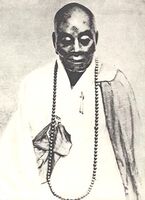Huineng: Difference between revisions
No edit summary |
No edit summary |
||
| Line 13: | Line 13: | ||
|PersonType=Chinese Buddhist Teachers | |PersonType=Chinese Buddhist Teachers | ||
|images=File:Huineng.jpg | |images=File:Huineng.jpg | ||
|YearBirth=638 | |||
|YearDeath=713 | |||
|DatesNotes=(February 27, 638 – August 28, 713) | |||
|BuNayDefProvComplex=No | |BuNayDefProvComplex=No | ||
|BuNayWheelTurnComplex=No | |BuNayWheelTurnComplex=No | ||
Latest revision as of 16:23, 14 July 2021
| PersonType | Category:Chinese Buddhist Teachers |
|---|---|
| MainNamePhon | Huineng |
| MainNameChi | 大鑒惠能 |
| MainNamePin | Dàjiàn Huìnéng |
| SortName | Huineng |
| bio | Dajian Huineng (traditional Chinese: 大鑒惠能; pinyin: Dàjiàn Huìnéng; Wade–Giles: Ta-chien; Japanese: Daikan Enō; Korean: Hyeneung); (February 27, 638 – August 28, 713), also commonly known as the Sixth Patriarch or Sixth Ancestor of Chan (traditional Chinese: 禪宗六祖), is a semi-legendary but central figure in the early history of Chinese Chan Buddhism. According to tradition he was an uneducated layman who suddenly attained awakening upon hearing the Diamond Sutra. Despite his lack of formal training, he demonstrated his understanding to the fifth patriarch, Daman Hongren, who then supposedly chose Huineng as his true successor instead of his publicly known selection of Yuquan Shenxiu.
Twentieth century scholarship revealed that the story of Huineng's Buddhist career was likely invented by the monk Heze Shenhui, who claimed to be one of Huineng's disciples and was highly critical of Shenxiu's teaching. Huineng is regarded as the founder of the "Sudden Enlightenment" Southern Chan school of Buddhism, which focuses on an immediate and direct attainment of Buddhist enlightenment. The Platform Sutra of the Sixth Patriarch (六祖壇經), which is said to be a record of his teachings, is a highly influential text in the East Asian Buddhist tradition. (Source Accessed July 14, 2021) |
| YearBirth | 638 |
| YearDeath | 713 |
| DatesNotes | (February 27, 638 – August 28, 713) |
| IsInGyatsa | No |
| Other wikis |
